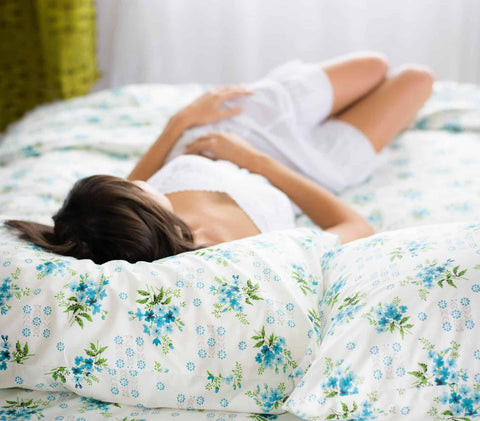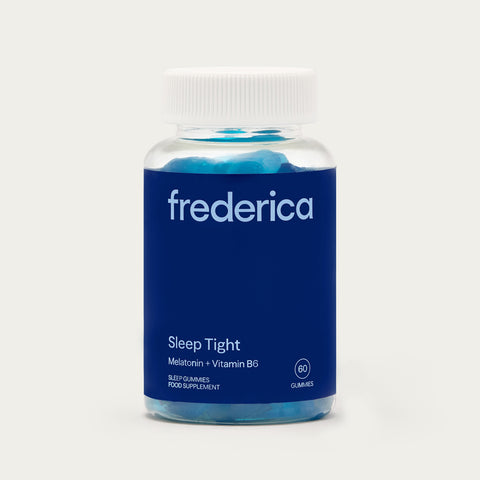Raise your hand if you've been suffering from insomnia lately (we've already seen a thousand and one hands up!). But what exactly is this sleep problem? Why does it appear when we most need sleep and when we most want to wake up feeling energized? That's what we'll try to answer, in the hope that, after reading this article, you'll be able to have more restful nights.
What is insomnia?
Insomnia is a disorder that impairs our ability to fall asleep and stay asleep throughout the night. Typically, people with insomnia feel tired from the start of the day, experiencing mood swings and a lack of energy.
There's also often a feeling of unrefreshing, poor-quality sleep, leading to fatigue that lingers throughout the day. The crucial issue (and one that can lead to long-term problems) is that all of this tends to worsen over time. Symptoms of depression and loss of memory and concentration are some of the obvious consequences that will be felt by all those who go through this phase.
Insomnia and the brain
In some cases, insomnia may be caused by certain neurotransmitters in the brain involved in sleep. According to the National Sleep Foundation , there are many possible chemical interactions in the brain that can interfere with sleep, which may explain why some people are biologically prone to insomnia and seem to struggle with it for years without any identifiable cause—even when following healthy habits.
What could be behind this problem?
Insomnia can be caused by medical conditions, unhealthy sleep habits, specific substances, or certain biological factors. Some studies suggest that insomnia may be a problem with the brain's inability to stop waking due to a malfunction in the sleep cycle.
There are many medical conditions that can lead to insomnia, including nasal allergies, gastrointestinal problems, asthma, chronic pain, neurological diseases, or medications you take for heart disease, depression, high blood pressure, among many others.
As we age, sleep-related problems become more frequent. Our biological clocks shift, and as a result, we end up feeling tired earlier in the evening and waking up earlier the next morning.
A lack of daily activities can also interfere with a good night's sleep, as the less active we are, the more time we have to sleep throughout the day, which makes it difficult to fall asleep at night (as is supposed to happen).
Something that complicates a peaceful sleep to a greater extent is the fact that we expose ourselves to certain electronic devices, due to the radiation they emit.
Along with all this, anxiety, depression and the frequent use of certain medications and/or alcoholic beverages are the main causes diagnosed for insomnia itself, in addition to stress , a poor diet (based on caffeine) and certain changes in schedules and routines.
The production of melatonin (the hormone that regulates our sleep-wake cycle, the daily pattern that determines when it's time to sleep and when it's time to wake up) is determined by factors such as light and noise. This idea leads us to believe that if we are exposed to very bright environments at night, the production of this hormone will be neglected.
Stress can also be our greatest enemy in this regard, as it raises our cortisol levels and causes us to wake up in the middle of the night. Ultimately, mental energy is one of the main causes of this scenario. This type of insomnia is the most common, dubbed "primary" insomnia, representing a direct response to stress . In cases where the latter is emotional (personal or professional losses and pressures), sleep is also impaired, as the worrying circumstances also generate adrenaline.
Why is sleep so important for the proper functioning of the immune system?
Studies show that a well-functioning immune system is the backbone of our health and essential for our defense against viruses. When viruses infect our cells, they attach to proteins on their surfaces and inject their own material, resulting in ever-increasing viral production. When this process is complete, the infected cell dies and releases new viruses, which infect other cells.
Despite this, our immune system has its own protective functions. The natural killer cells that are part of our internal defenses are crucial for fighting various types of viruses, but for them to be present in the body and in sufficient quantities, our sleep must be restorative. This is why when we don't get enough sleep, we are more susceptible to illness and infections.
What to do?
If you regularly have trouble sleeping, it might be a good idea to take a general look at your health and see if there are any conditions or behaviors that could be contributing to this situation.
In some cases, there are simple steps you can take to improve your sleep – avoid bright lighting while relaxing and try to limit potential distractions, such as television, computers, or cell phones.
In other cases, it's important to talk to your doctor to try to resolve the issue. You shouldn't accept the habit of "poor sleep" as a way of life. Insomnia is treatable, but everyone responds differently to different approaches.
Here are some tips that might help you:
- Make your bedroom a more welcoming and relaxing place to enjoy restful sleep.
- Avoid stimulants before bed, especially within six hours. Avoid coffee, caffeinated teas, hot dark chocolate, or energy drinks.
- Create a scheduled routine (both for sleep and waking). This discipline can help your body understand when to "turn on" and "turn off";
- Try to choose light foods before going to bed;
- Forget your problems before going to bed. Don't let what's bothering you disturb you to the point of keeping you awake. Relax and be kind to yourself;
- Do a meditation before bed to quiet your mind;
- Lying in bed awake can contribute to insomnia by creating a detrimental association between your bedroom and being awake. Commit to getting out of bed whenever you've been awake for 20 minutes or more, then go to a different part of your house to 'reset' with a different restful activity before trying to fall asleep again.
The more we struggle with insomnia, the more we worry about it – and that worry leads to even more sleepless nights.
There are therapies that can be very helpful, namely cognitive behavioral therapy, which involves a combination of specific behaviors (establishing regular sleep and wake times, practicing rational and positive thinking, etc.).
What precautions should people who are teleworking take?
If you've set up your home office, you should ideally choose a location outside of your bedroom, or at least a separate corner to work. Verena Senn, neuroscientist and sleep expert at Emma - The Sleep Company , recommends compartmentalized areas for daily routines and work, as well as areas for rest and leisure. This also applies to schedules.
Zzzzzz. Relax.
It's crucial to work toward relaxation. Discover which ritual calms you most and keeps you in perfect harmony with yourself. Take a hot bath, drink some tea, and always maintain a positive mindset.
Purchase our quality sleep-activating gummies at the link below and enjoy a more peaceful and positive day. These are a great supplement, containing melatonin and vitamin B6, and are a valuable aid in promoting more restful nights of sleep, respecting the sleep cycle and calming your nervous system. Sleeping like a baby has never been easier.


































